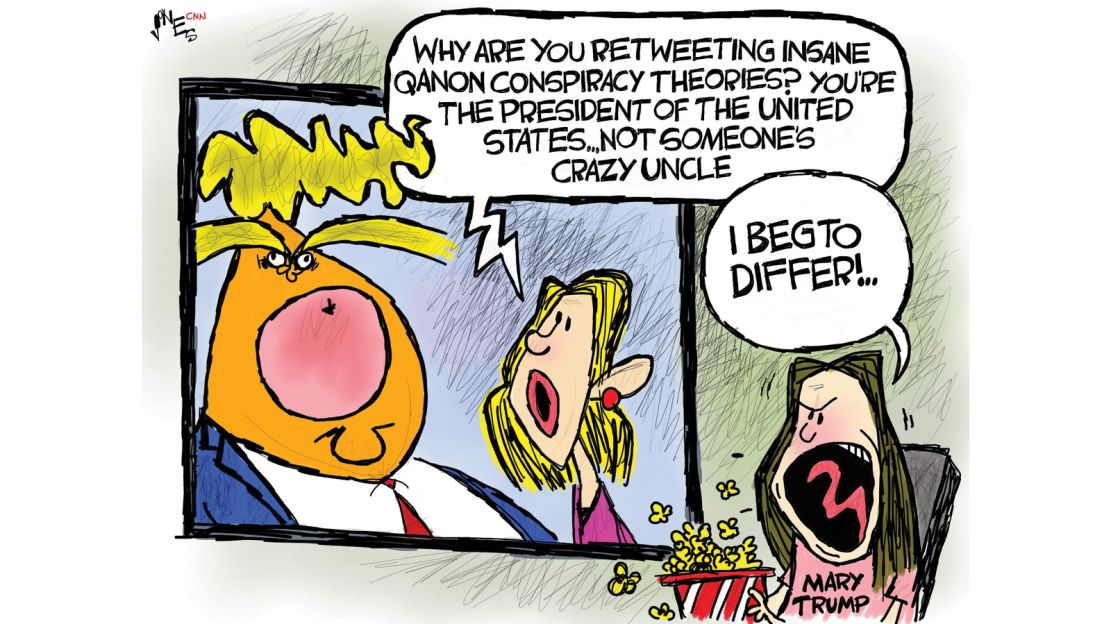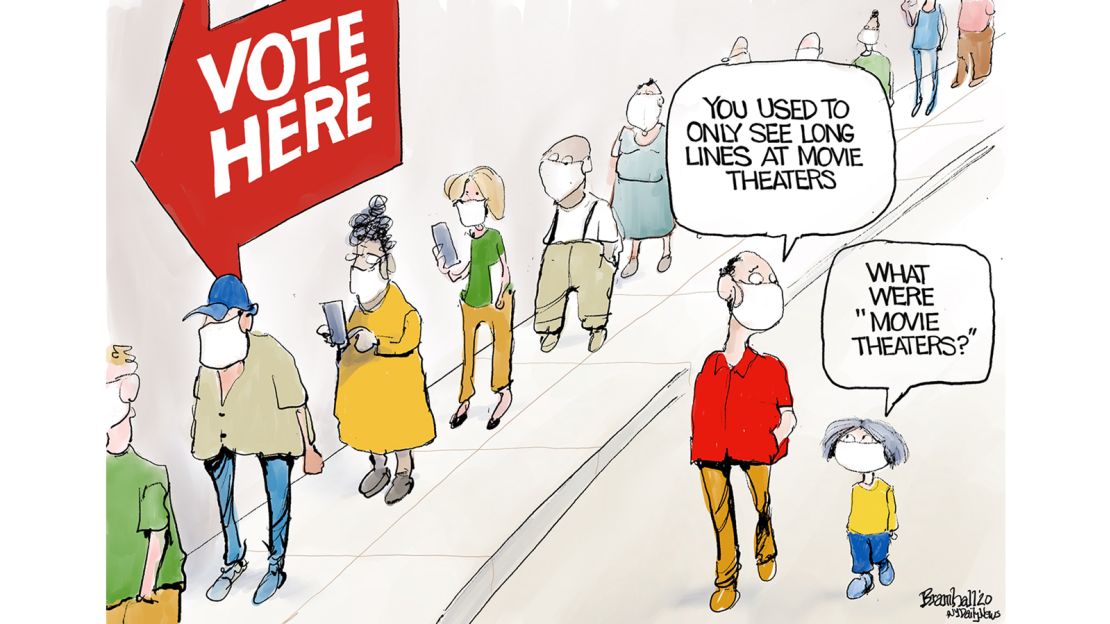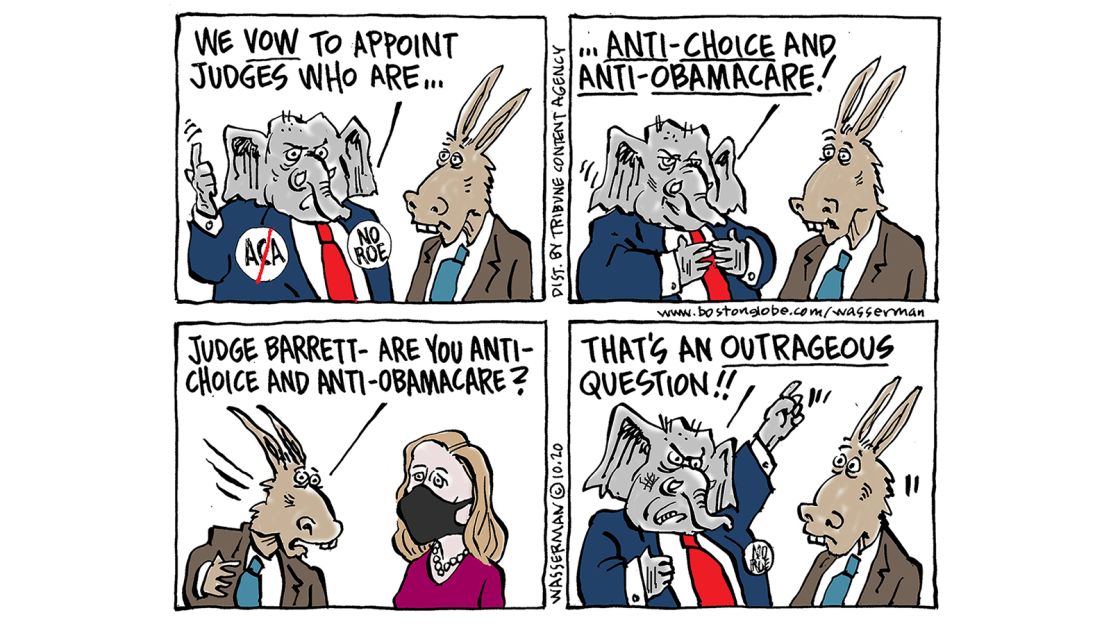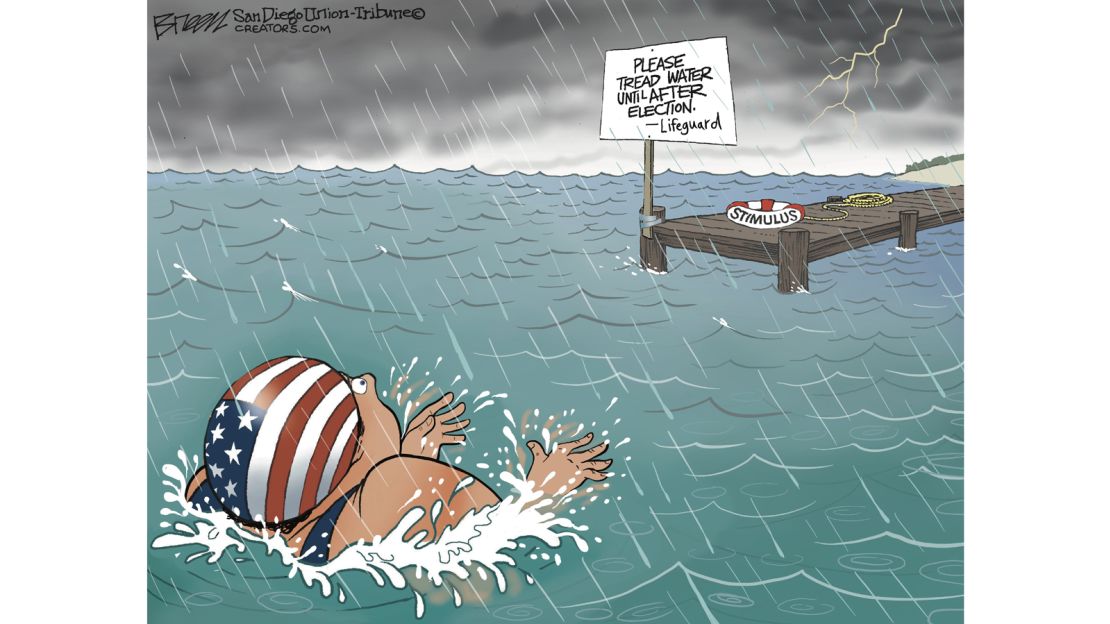Editor’s Note: Sign up to get our new weekly column as a newsletter. We’re looking back at the strongest, smartest opinion takes of the week from CNN and other outlets.
In the pantheon of Greek gods, Dionysus loomed large. He was the god of fertility, the god of wine and, at the springtime festivals held in his name, the deity most closely associated with the birth of theater.
This week in America he would have felt cheated, as an opportunity for real drama slipped through his fingers.
Instead of an originally scheduled head-to-head debate, President Donald Trump and former Vice President Joe Biden appeared separately — in different cities, with different moderators and on different networks — in overlapping town halls.
Had they been on the same stage, the striking differences between the two — and the choice voters face two weeks from now — would have seemed even more dramatic:
Trump, on NBC, bragging about his administration’s record, sowing confusion about the best health practices in a pandemic, refusing to tamp down rampant conspiracy theories like QAnon and expressing confidence he will win his bid for re-election.
Biden, on ABC, methodically describing policies he would implement as president, emphasizing the injustice of discrimination against transgender people and of the practice of redlining, touting the benefits of pelletizing horse and cow manure to reduce carbon emissions, conceding that he had made mistakes in his career and grappling with the chance he might lose.
“NBC’s Savannah Guthrie spoke for most Americans in frustration by pointing out that Trump was the President of the United States, not someone’s crazy uncle,” wrote Joe Lockhart. “But for anyone watching Thursday night, what they got was a full dose of America’s crazy uncle.”

It was a disaster for the President, Lockhart wrote, because so much of the conversation was about the country’s failed response to the coronavirus pandemic. Trump even lost the TV ratings battle to Biden’s town hall.
The most alarming part of Trump’s town hall? “The moment,” wrote Frida Ghitis, “when he not only refused to denounce, but actually appeared to defend QAnon, a collective of conspiracists so extreme in its beliefs that one shudders to hear what its followers think.”
Trump biographer Michael D’Antonio noted that the President “replied to a question about the conspiracy theory phenomenon by saying, ‘I know nothing about Q Anon.’ He said this even though he has distributed QAnon-based claims with his own social media accounts, and his rallies have long been gathering spots for vocal and highly visible displays of QAnon symbols and ideas.” As D’Antonio observed, it’s characteristic Trump, who has said he knew nothing about former KKK grand wizard David Duke in 2016 and the Proud Boys in 2020.
With less than three weeks until the election, NBC made a big mistake scheduling the Trump town hall for the same time as the first hour of the Biden event, wrote Jill Filipovic. The network gave Trump “exactly what he wants: His own platform without the more thoughtful, and more presidential Joe Biden standing in sharp contrast next to him. NBC will get the ratings it expects by turning a political event into reality show theater. And the American public will lose out.”
For all the specificity of his policy plans, Biden was purposely hazy on whether he would move to expand the Supreme Court, wrote Alice Stewart. He “heads into next week’s scheduled debate in the pole position: in the front row, leading in the polls, with momentum on his side.” As the leader in the polls, Biden had reason “to play it safe” but voters should expect “him to come clean on key issues,” Stewart observed.
Biden and Trump are scheduled to meet for their second and final debate Thursday.
A passion for voting

No one has seen anything like it: early voting is smashing records around the country.
Among the people waiting to cast their ballots was Norman F. Robinson III, the son of civil rights demonstrators in the 1960s. It took him four hours to vote in Decatur, Georgia. “It’s not just about finding the will to stand in a long line – it’s also about choosing to do so as safely as we can in the midst of a deadly pandemic,” observed Robinson. He was happy to see that almost everyone wore a mask, though they didn’t always observe 6 feet of distancing.
Robinson thought about voting by mail, but like many others was concerned by the political attacks on that practice. He wasn’t going to take the risk that his voice wouldn’t be heard. “For me, standing in that long line was inspired by the deaths of Ahmaud Arbery, Rayshard Brooks and George Floyd,” he wrote. “It was important for me to be there because we have a President who encourages the Proud Boys to ‘stand back and stand by.’ Our voices will be heard and our mandate is our vote.”
Actor and singer Mandy Patinkin says he “wasn’t always the liberal snowflake Hollywood elitist pinko commie socialist Democrat some of my Twitter commenters tell me I am.” He credits his wife Kathryn and friend Martin Sheen with making him realize that everything we do is political in some way.
“When I look at this political moment,” he wrote, “when I see the divisive, mean-spirited, hateful rhetoric that appears to be driving our politics, I can grow despondent. It can feel as though we’ve lost our way.” Patinkin said he draws hope from the way people are caring for each other through the pandemic. He said he is backing Joe Biden. “If we’re going to fall in love with one another again, as Americans, then this is the time to show up, to commit and to make the right choice for our future,” Patinkin observed.
For more on the election:
John Avlon: Armed election observers are a recipe for Election Day disaster
Joshua A. Douglas: Courts are supposed to protect the right to vote
Dean Obeidallah: What Trump really wants from his risky rallies
Nolan Finley: Why Trump could win Michigan again
Robert Alexander: The battle to be the president of the swing states of America
Robin Cogan, Barbara Glickstein and Diana J. Mason: Why your vote could be a life-or-death decision
Amy Coney Barrett’s hearing

The takeaway from four days of hearings this week on the Supreme Court nomination of Judge Amy Coney Barrett was clear: Democrats have no realistic way to stop her confirmation in the final days of the presidential campaign.
As historian Julian Zelizer pointed out, this is the fulfillment of a decades-long battle by Republicans to shift the nation’s top court decisively to the right. “With Barrett on the Supreme Court, whatever happens in November, the conservative court will be a major legacy of the Trump presidency,” he wrote. “It will constitute a huge blow to Democrats, who have lost this political battle.”
Barrett would fill the seat vacated by the death of Justice Ruth Bader Ginsburg. Actress Ashley Judd remembered RBG as “our voice in the room who steadily, unflinchingly, defended the equal dignity, rights and protections under the law of women and men.” By contrast, Judd wrote, Barrett’s history suggests she’ll follow a different path: “She will have the chance to render enormously consequential decisions for American women for generations to come. Based on her record, we should be profoundly alarmed.”
Barrett gave little ground on issues raised by Democratic senators, insisting that there were many areas she could not comment on because they might come before the court someday. Elliot Williams wasn’t buying it. “In response to New Jersey Sen. Cory Booker, Barrett refused to answer the straightforward question of whether every American President ‘should make a commitment – unequivocally and resolutely – to the peaceful transfer of power,’” Williams wrote.
“It would not have been hard for Barrett to show some distance from the President by restating uncontested points about the law – particularly to a nation hungry for peaceful and secure elections in the middle of a global pandemic.”
In Paul Callan’s view, Barrett sailed through the hearings. “With six of her seven children, her husband and other family members watching proudly from the seats behind her, Barrett demonstrated a keen intellect, along with a formidable self-confidence leavened by just the right splash of humility under hours of senatorial questioning,” Callan wrote.
For more on Barrett and the court:
Laura Coates: Really, Sen. Cruz? This is what you asked Judge Barrett
Judith Resnik: The size of the Supreme Court is only part of the problem
Judd Gregg and Charles Wheelan: A modest proposal on SCOTUS (more ‘West Wing’ than ‘House of Cards’)
Ilya Shapiro: Barrett hearings shine a light on the differences between Democrats and Republicans
Paul Begala: Amy Coney Barrett’s truly scary association
Walter Olson: Packing the Supreme Court would lead to a slippery slope
Getting off the Trump train?
Through the raging controversies of the Trump administration, Republicans have stood by the President, with few exceptions.
But now – with Trump behind Biden by double digits in national polls, with Democrats raising more money than Republicans in many races and GOP control of the Senate at risk – “the fever may be starting to break,” wrote John Avlon. “Donald Trump has held his party in line with bullying tactics and the white-hot love of the conservative populist base.”
Avlon spoke with longtime Republican operative Ed Rollins, who said “the potential is there to lose not only the presidency but the Senate as well … and to see the kind of wipeout we haven’t an experienced since the post-Watergate year of 1974.” Avlon concluded, “as he threatens democratic norms and insists on his alternate reality, more Republicans may — at least in cold moments of private panic — awaken from their hyperpartisan stupor to realize that loyalty is always a one-way street with Trump.”
One Republican could make a huge difference in the campaign’s endgame, argued Arick Wierson and Bradley Honig. As unlikely as it is, they wrote, former President George W. Bush should declare his support for Joe Biden. “This is a rare moment in history when it becomes incumbent upon a former president to perform a service that he alone is positioned and qualified to do: endorse the candidate from the opposing party to save democracy from a successor who has openly suggested he would work to erode the voting process.”
It would be a mistake to conclude from the polls that the election is already decided, wrote Eric Zorn in the Chicago Tribune. “Biden’s average polling lead today is smaller than (Hillary) Clinton’s was at a similar point in 2016 in Florida, Michigan, Pennsylvania, Wisconsin and Ohio,” he noted. “It’s slightly larger than Clinton’s lead was in North Carolina. And, of course, for what it’s worth (not much), his lead is significantly larger than Clinton’s was in the national polls.”
Zorn added that the issues and the mood of voters are different this time, so, “I’m not saying history is going to repeat itself. I’m saying don’t for a second think this race is over.”
For more views on Trump and the GOP:
Asha Rangappa: The alarming question behind Barr’s ‘unmasking’ probe
Jill Filipovic: Mitch McConnell’s disturbing chuckle
William I. Hitchcock: How paranoia in presidential politics went mainstream
A dangerous plan on Covid-19

In a document they call the “Great Barrington Declaration,” a group of scientists has argued against Covid-19 lockdowns. This week some top Trump administration officials — though not Dr. Anthony Fauci — indicated they’re open to the idea of aiming for “herd immunity,” noted Jeffrey D. Sachs.
Their view: “Let the pandemic run its course until most of the population is infected and has ostensibly developed antibodies to ward off future infections. Typical estimates hold that 70% or more of the population would thereby become infected,” Sachs pointed out.
“If implemented, a herd immunity strategy might just be the most reckless action by the White House yet.” Hundreds of thousands of Americans could die or develop long-term complications from Covid and vulnerable populations would be at severe risk. “If a reliable and safe vaccine will soon be available to protect citizens, surely there is overwhelming reason not to become infected now, but rather to stay safe until the vaccine arrives,” Sachs wrote.
Covid-19 has had a devastating effect on many big cities, “emptying normally bustling streets and haunting formerly crowded subways,” Fareed Zakaria wrote in an excerpt from his new book, “Ten Lessons for a Post-Pandemic World.”
“People sheltered in place or scattered to the suburbs. Work shifted to laptops and Zoom, as the energy of cities was replaced by an eerie quiet.”
Does this spell doom for cities? As in past crises, people will return, Zakaria wrote. “Cities are an ideal way to organize human beings for modern life — allowing people to mingle, work, and play, all in the same place. They help build the economic and social capital upon which healthy societies rest.”
Don’t miss
Michael Bociurkiw: The conflict we can’t ignore
Jeff Yang: ‘The West Wing’ reunion shows us a world very, very far away
Amanda Mattingly: Biden is no friend to Maduro
AND …
Storms and fires
Hurricanes are given human names like Katrina, Maria and Sandy each season to help people make a connection with these enormous natural phenomena. For only the second time, as John D. Sutter noted, this year the “World Meteorological Organization has run out of human names … for storms in the Atlantic.” So now they are using the letters of the Greek alphabet.
On October 7, Hurricane Delta hit Mexico’s Yucatan Peninsula and two days later, it made landfall in Louisiana. It arrived in the US, where at least four people died, just about a week after Tropical Storm Gamma hit Tulum, Mexico.
“Unnatural disasters like these Atlantic storms, which we know are supercharged by global warming, are becoming so frequent and so dangerous that they almost have a numbing effect on our collective psyche — the opposite of the intended effect of naming storms in the first place,” wrote Sutter.
In a series of special reports for CNN Opinion this fall, Sutter will be answering readers’ questions about the impact of climate change, including “the myriad wildfires burning in California, Oregon and Washington.” (Normally such disasters bring quick assistance from the federal government, but on Friday, the state of California confirmed that the Trump administration had turned down its request to declare a disaster over six wildfires in, what Tess Taylor wrote, “seemed to be a colossal act of pettiness and cruelty.” Later in the day Trump reversed the decision.)
Sutter, who has reported on climate for years, wants to address the fears “many around the world share, even if they don’t have the exact words to express it. Maybe that’s you. Or maybe you’re too tired or worried or just so overwhelmed these days that it only occurs to you late at night, when the kids are asleep or you’re alone and there’s no one to talk to…”
“The truth is, we don’t have to be paralyzed by the magnitude of this crisis. There are workable solutions — we’re just not pursuing them, or not doing so anywhere near the economy-shifting scale (or the planet-saving speed) that the science of global warming requires.”
















